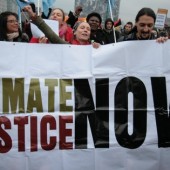





In this insightful review of Brian Tokar’s book, Randall Amster hails the work as a hopeful response to climate change that, rather than playing off of apocalyptic scenarios, envisions a future where society is re-structured not only in technological and economical terms, but also towards a more socially equitable way of life.
Continue Reading
 Journal of Sustainability Education is licensed under a Creative Commons Attribution License.
Journal of Sustainability Education is licensed under a Creative Commons Attribution License. 